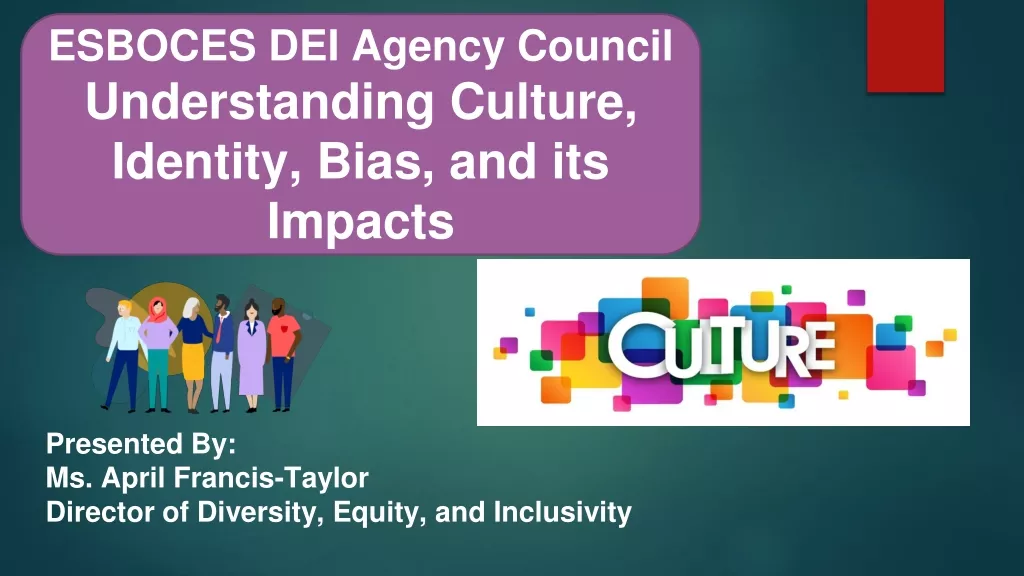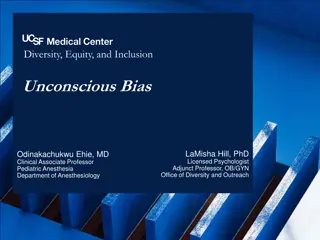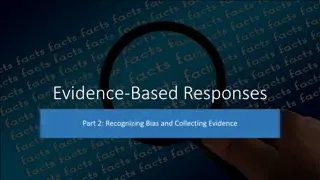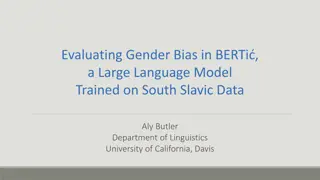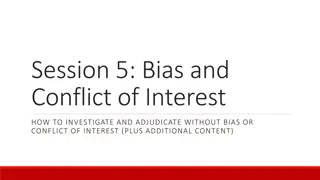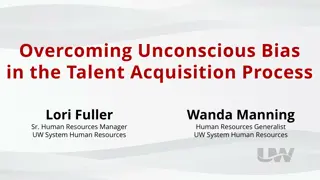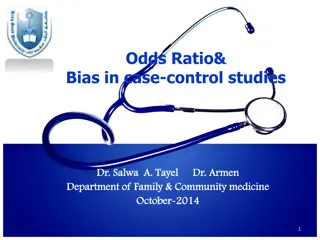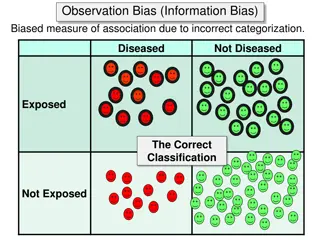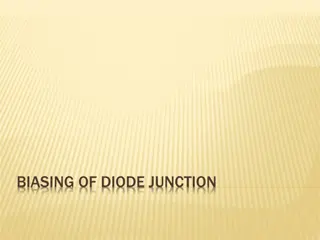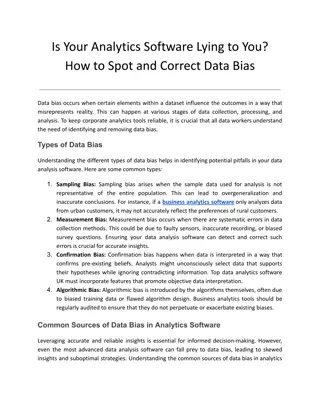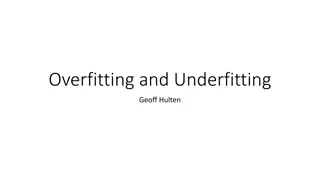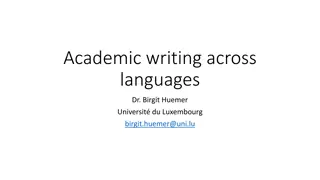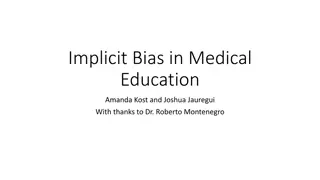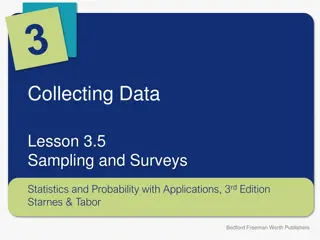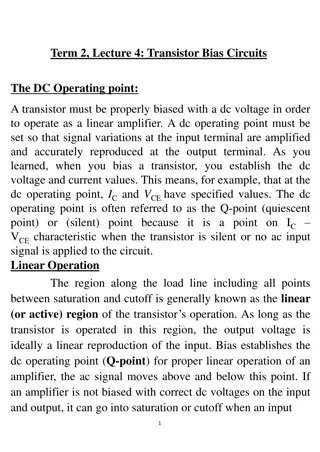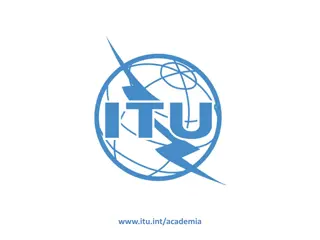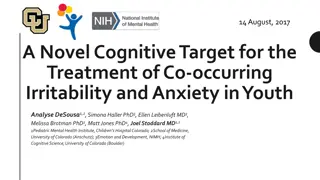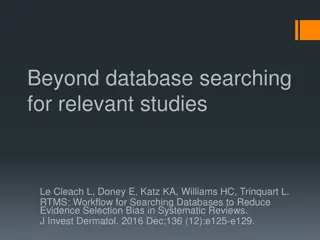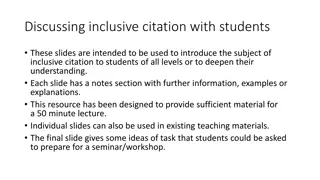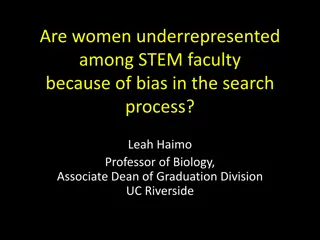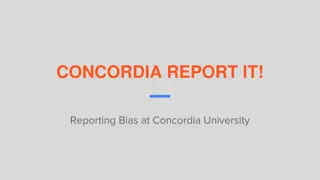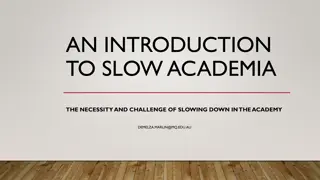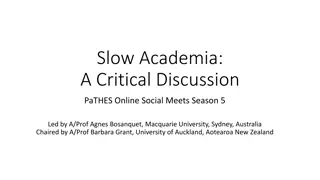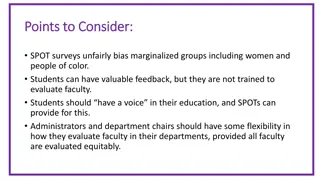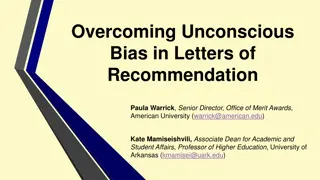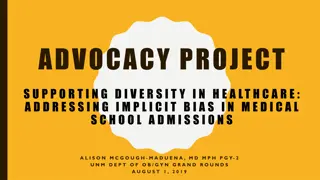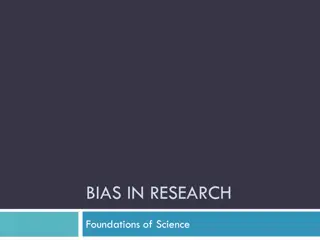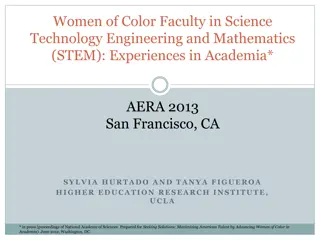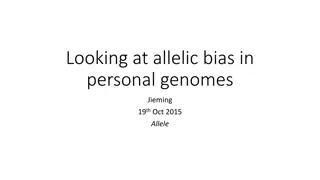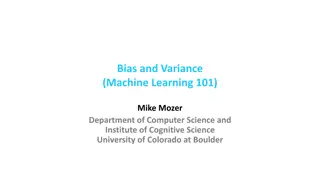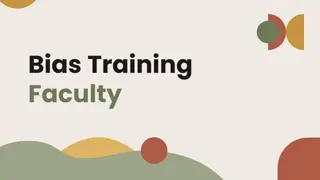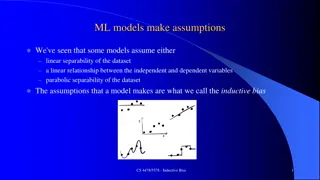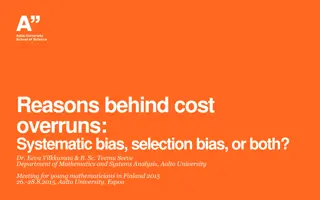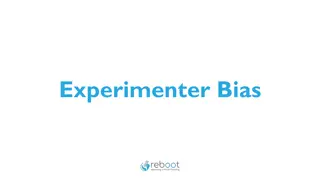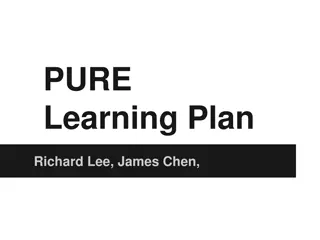Understanding Culture, Identity, Bias, and Diversity in the Workplace
This presentation highlights the importance of understanding culture, identity, bias, and their impacts in the workplace. Through courageous conversations and diversity training, participants learn to unpack implicit bias, combat bias, and develop teamwork skills. The session emphasizes staying enga
0 views • 19 slides
Unconscious Bias
Delve into the realm of diversity, equity, and inclusion through an interactive workshop focused on understanding unconscious bias, reducing bias in a safe space, intentional application in clinical settings, and successful interactions with diverse colleagues and patients. Engage in thought-provoki
1 views • 29 slides
Understanding and Avoiding Bias in Evidence-Based Responses
Recognizing bias in oneself and others is crucial when collecting evidence. Different types of bias, such as confirmation bias, can influence decisions and behaviors significantly. By exploring our own thinking and accessing curated resources to learn about bias, we can develop a deeper understandin
1 views • 14 slides
Evaluating Gender Bias in BERTi: Insights on Large Language Models
This study delves into gender bias evaluation in BERTi, a large language model trained on South Slavic data. It explores issues in language modeling, the impact of social biases in artificial intelligence, and training processes of Large Language Models (LLMs). Additionally, it discusses how LLMs le
11 views • 16 slides
Recognizing Hidden Bias in the Workplace
In the workplace, hidden bias, also known as implicit bias, can significantly impact hiring, employment decisions, and overall workplace dynamics. Deloitte's 2019 State of Inclusion Survey revealed that a substantial percentage of workers experienced bias at least monthly. Hidden biases can be based
3 views • 18 slides
Investigating Bias and Conflict of Interest: Guidelines for Fair Adjudication
Explore the intricacies of bias and conflict of interest in investigations, learn how to identify and counteract them to ensure fairness in decision-making. Topics include understanding bias, detecting it, LGBTQ terminology, evidence collection, and remedial actions like recusal. Navigate the nuance
0 views • 21 slides
Overcoming Unconscious Bias in Talent Acquisition Process
Overcoming Unconscious Bias in Talent Acquisition Process emphasizes the importance of addressing unconscious bias in hiring practices through awareness and control. The content delves into defining unconscious bias, its impact on diversity, examples, and strategies for managing bias. The University
0 views • 19 slides
Understanding and Utilizing Bias in Legal Proceedings
Exploring the complexities of bias in legal settings, this content provides insights on identifying, addressing, and leveraging bias in litigation. From defining various forms of bias to strategies for cross-examination and case presentation, it equips legal professionals with practical knowledge to
0 views • 19 slides
Understanding Odds Ratio and Bias in Case-Control Studies
This educational material covers the essentials of odds ratio and bias in case-control studies, including how to construct a 2x2 table, calculate odds ratio, define bias, and interpret results. A specific case study on pesticide exposure and cancer is presented to illustrate these concepts. Readers
2 views • 20 slides
Types of Bias in Epidemiological Studies
Bias in epidemiological studies can arise from misclassification of observations and exposures, leading to incorrect associations between variables. Observation bias, misclassification bias, and non-differential misclassification can impact the accuracy of study results, either minimizing difference
1 views • 11 slides
Understanding Diode Junction Biasing: Zero and Forward Bias Conditions
In the world of electronics, diode junction biasing plays a crucial role. This article delves into the concepts of zero and forward bias conditions for diodes. When a diode is zero-biased, no external potential energy is applied, while in forward bias, a specific voltage is introduced to initiate cu
0 views • 21 slides
Is Your Analytics Software Lying to You_ How to Spot and Correct Data Bias
Data bias can distort your analytics and lead to misguided decisions. In this blog, learn how to identify common signs of data bias, understand its impacts, and explore effective strategies to correct it. Enhance the accuracy and reliability of your insights with practical tips and advanced tools, e
3 views • 8 slides
Understanding Bias and Variance in Machine Learning Models
Explore the concepts of overfitting, underfitting, bias, and variance in machine learning through visualizations and explanations by Geoff Hulten. Learn how bias error and variance error impact model performance, with tips on finding the right balance for optimal results.
0 views • 22 slides
Understanding Academic Writing Across Languages: Challenges and Solutions
Explore the historical development of languages in academia and science, equivalence issues, written academic genres, evolution from Latin to national academic languages, and the importance of a common language in academia. Dive into the specialized text structures, syntax, idiomatic phrases, and pr
0 views • 29 slides
Understanding Implicit Bias in Medical Education
Delve into the origins, forms, and manifestations of bias in clinical and medical education settings. Learn strategies to mitigate and address bias through a detailed exploration of terms like System 1 and System 2 thinking, implicit bias, race/racism, sexism, microaggressions, and more. Gain insigh
6 views • 27 slides
Understanding Bias in Sampling and Surveys
Bias in sampling and surveys can arise from undercoverage, nonresponse, and response bias. Even when samples are randomly selected, various factors can lead to inaccurate results. Researchers need to be aware of these biases and take steps to minimize them, such as testing surveys before full deploy
0 views • 8 slides
Understanding Transistor Bias Circuits for Linear Amplification
Transistor bias circuits play a crucial role in setting the DC operating point for proper linear amplification. A well-biased transistor ensures the signal variations at the input are accurately reproduced at the output without distortion. Various biasing methods such as Voltage-Divider Bias, Emitte
0 views • 7 slides
Insights from ITU's Online Academia Consultation
Explore the outcomes of ITU's inclusive consultation with academia, focusing on exchanging views to meet academia's needs. Learn about the primary reasons to join ITU, the role of standards in education, challenges for academia, and notable journals. Discover the opportunities for collaboration, kno
0 views • 14 slides
Novel Cognitive Target for Treating Irritability and Anxiety in Youth
Research explores Hostile Interpretation Bias as a potential target for treating co-occurring irritability and anxiety in youth. The study investigates why this bias persists in irritable individuals and proposes Interpretation Bias Training as a treatment approach. Computational learning models are
0 views • 22 slides
Managing Reporting Bias in Systematic Reviews - Strategies and Consequences
Reporting bias poses a significant threat to the accuracy of systematic reviews, with publication bias affecting up to 50% of trials. This bias distorts treatment effect estimates, leading to exaggerated outcomes. Strategies to mitigate reporting bias include searching bibliographical databases, exp
1 views • 17 slides
Exploring Inclusive Citation Practices in Academia
Explore the concept of inclusive citation practices in academia through a series of informative slides covering topics such as academic neutrality, power structures in citation, unequal power dynamics in academia, colonial legacies, academic vs. non-academic sources, and more. Encourage critical thi
0 views • 11 slides
Understanding Transition Bias and Substitution Models in Genetics
Transition bias and substitution models, explored by Xuhua Xia, delve into the concepts of transitions and transversions in genetic mutations, the causes of transition bias, the ubiquitous nature of transition bias in invertebrate and vertebrate genes, the mitochondrial genetic code, and RNA seconda
1 views • 25 slides
Career Opportunities in Academia for Optometrists
Explore the growing demand for optometry faculty in academia, focusing on the need for teaching and research expertise. Discover academic entry points, such as MS and PhD programs, residencies, and innovative K12 Mentored Clinical Scientist Development Programs to enhance your career in optometry ac
0 views • 11 slides
Gender Bias in STEM Faculty Recruitment
Research indicates that women are underrepresented among STEM faculty members, potentially due to bias in the search process. Studies show evidence of bias against women candidates in male-dominated fields like mechanical engineering, leading to lower hiring rates. Another study revealed bias in fac
0 views • 29 slides
Addressing Bias-Related Incidents at Concordia University
The report discusses bias reporting at Concordia University, highlighting the importance of understanding and addressing bias-related incidents. It covers examples of bias, distinction between bias incidents and hate crimes, and strategies for response. Presenters from the Office of Multicultural En
0 views • 11 slides
The Necessity of Slowing Down in Academia: An Introduction to Slow Academia
Slow Academia challenges the prevailing culture of speed in academic environments by addressing issues such as Time Sickness and the pressure for high productivity. This article explores the impacts of time poverty, the corporate university structure, and the fragmentation caused by excessive time-m
0 views • 17 slides
Engaging with Slow Academia: A Critical Discussion on Theorizing and Self-Reflection
Join the thought-provoking discussion on slow academia led by experts from Macquarie University and the University of Auckland. Explore theoretical works resonating with slow academia, feminist perspectives, institutional responses, subjectivity theorizing, and more. Engage in a reflective, inclusiv
0 views • 15 slides
Addressing Bias in Student Evaluations of Faculty: Considerations and Resolutions
SPOT surveys can unfairly bias marginalized groups in academia, such as women and people of color, impacting faculty evaluations. While student feedback is valuable, students may not be equipped to assess teaching effectively. Institutions should use SPOT data for reflection rather than consequentia
0 views • 4 slides
Gender Bias in Academic Letters of Recommendation
Gender bias in academic letters of recommendation has been highlighted through various studies, showing disparities in the language used for male and female applicants. Female applicants often receive shorter letters with fewer standout words, more communal adjectives, and references to teaching rat
0 views • 14 slides
Addressing Implicit Bias in Medical School Admissions
Increased diversity in the healthcare workforce benefits health outcomes, but implicit bias can impact candidate selection in medical school admissions. This advocacy project aims to address implicit bias by developing training sessions for new members of the admissions committee at UNM SOM, focusin
0 views • 9 slides
Uncovering Bias in Research: Foundation of Science
Exploring the presence of bias in research, this compilation delves into various types of biases such as confirmation bias and fundamental attribution error. It also addresses the challenges of explaining behaviors rooted in biases and offers insights on reducing bias in the scientific process. Thro
0 views • 6 slides
Understanding Experiences of Women of Color Faculty in STEM Academia
Women of color face unique challenges in STEM academia due to the intersectionality of gender and race, impacting their workplace perceptions. This paper explores the experiences of underrepresented women of color in academia, comparing them with their STEM colleagues in terms of stress sources, wor
0 views • 11 slides
Investigating Allelic Bias in Personal Genomes
This study delves into allelic bias in personal genomes, examining the influence of various factors such as sequencing datasets, removal of reads with allelic bias, and the impact on allele-specific single nucleotide variants (AS SNVs). The revised AlleleDB pipeline proposed includes steps for const
0 views • 6 slides
Understanding Bias and Variance in Machine Learning
Exploring the concepts of bias and variance in machine learning through informative visuals and explanations. Discover how model space, restricting models, and the impact of bias and variance affect the performance of machine learning algorithms. Formalize bias and variance using mean squared error
0 views • 21 slides
Enhancing Bias Training for Faculty at the University of Utah
Transform faculty training on bias at the University of Utah through engaging slides designed to raise awareness, combat implicit bias, and promote inclusivity. Empower educators to recognize and address bias in their teaching practices for a more equitable learning environment.
0 views • 21 slides
Understanding Inductive Bias in Machine Learning
Machine learning models rely on inductive bias, which are the assumptions made by algorithms to generalize from training data to unseen instances. Occam's Razor is a common example of inductive bias, favoring simpler hypotheses over complex ones. This bias helps algorithms make predictions and handl
0 views • 20 slides
Understanding Implicit Bias: Exploring Bias, Stereotypes, and Discrimination
Explore the concept of implicit bias through discussions about prior knowledge, feelings pre and post taking implicit association tests, and how this awareness can be applied beneficially in personal and classroom settings. Definitions of implicit bias, stereotypes, prejudice, and discrimination are
0 views • 21 slides
Understanding Cost Overruns in Projects: Systematic Bias vs. Selection Bias
Cost overruns in projects can be attributed to systematic bias, like optimism bias and strategic misrepresentation, or selection bias where projects with low estimated costs are more likely to be selected leading to underestimation. Mitigating these biases is crucial for accurate project budgeting a
0 views • 21 slides
Understanding Experimenter Bias in Research Studies
Experimenter bias occurs when researchers introduce their own biases into an experiment, potentially impacting the outcome. This bias can manifest in various ways, such as manipulating results or selecting participants who confirm preconceived notions. Through examples in studies about toddler sleep
0 views • 9 slides
Investigating Bias in Newspaper Articles through Natural Language Processing
The project, mentored by Jason Cho and advised by Professor Eric Meyer, focuses on automatic bias detection in newspaper articles. It involves recognizing similar article topics and detecting bias using tools like OpenNLP and Python NLTK. The endeavor aims to uncover words correlated with bias and a
0 views • 5 slides
